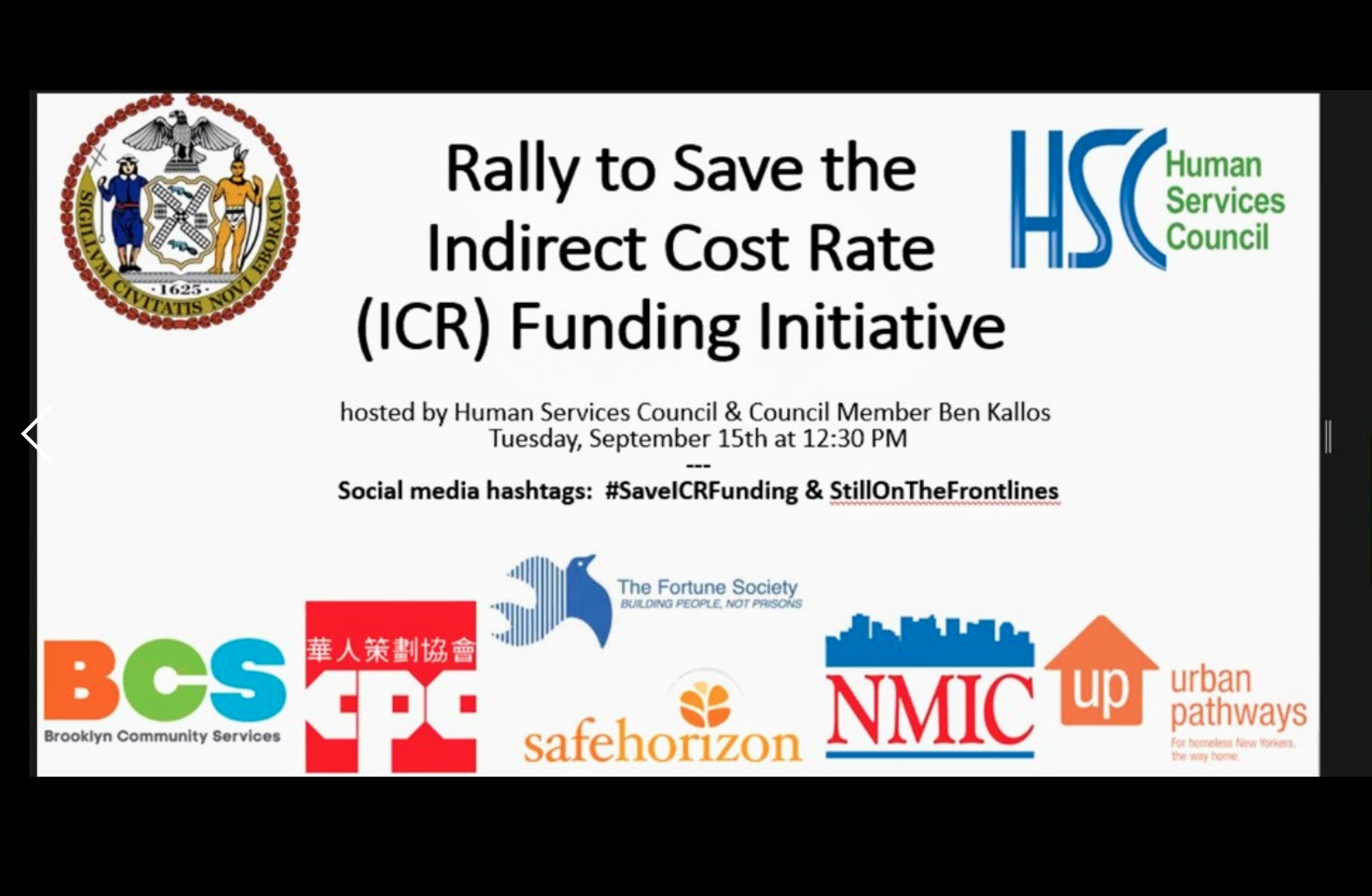CPC Rallies with Nonprofits to Save the Indirect Cost Rate

On September 15th, CPC joined the Human Services Council, Council Member Ben Kallos, and dozens of human services providers to call for the Mayor to reinstate funding for indirect costs and to end retroactive budget cuts to the Indirect Cost Rate (ICR) Funding Initiative. More than 140 people participated in the rally, including Manhattan Borough President Gale Brewer, Council Member Brad Lander, and Council Member Helen Rosenthal.
See below for the full press release.
See media coverage from Tap Into here.
FOR IMMEDIATE RELEASE
September 15, 2020
Contacts:
CM Kallos – Josh J. Jamieson, JJamieson@BenKallos.com, 516-369-2921 (mobile)
HSC – Charles Kretchmer Lutvak, charles@risaheller.com, 917-748-3096 (mobile)
Nonprofits Rally, Call on Mayor to Fully Reinstate Funding for Indirect Costs
Cuts Represent an Existential Threat to NYC Nonprofits
Millions of Dollars in Funding Cut Retroactively, Nonprofits Were Promised Reimbursement
New York, NY – Today, several of New York City’s nonprofit human services organizations held a rally demanding that Mayor de Blasio restore funding for their indirect costs and end retroactive budget cuts to the Indirect Cost Rate (ICR) Funding Initiative.
Human services nonprofits cannot provide the necessary services and jobs New York City needs to continue to respond and recover from Covid-19 if the City does not honor its financial commitments to them. When the mayor’s FY20 April Executive Plan (April 2020) cut ICR funding nearly 40% (from $54 million to $34 million) under the guise of a “right-sizing,” providers were told that all FY20 reimbursements would be completed, as the City guaranteed in November 2019. More than a month after approval of the FY21 Adopted Budget – six weeks after the end of FY20 – providers were informed that FY20 indirect funding would actually be cut retroactively up to 40%.
FY21 indirect funding remains uncertain. The City is asking providers to wait five months into FY21 to find out if they will receive their full indirect funding for the current fiscal year, despite past commitments that the ICR Funding Initiative funding would not be cut due to the City's budget deficit.
Underfunding was an issue prior to the pandemic: more than half of NYC human services nonprofits cannot keep even two months of cash on hand, due to underfunded government contracts, a problem that dates back years. This funding crisis was the main driver behind last year's groundbreaking commitment to strengthening health and human services infrastructure through increased indirect funding. These retroactive cuts undermine the City’s progress and put providers at significant financial risk when the need for their services is skyrocketing.
The rally was led by Council Member Ben Kallos, Chair of the City Council Contracts Committee, and Human Services Council Executive Director Michelle Jackson. Other speakers included:
● Manhattan Borough President Gale A. Brewer
● Council Member Brad Lander
● Council Member Helen Rosenthal
● Ariel Zwang, CEO of Safe Horizon
● Wayne Ho, President & CEO of the Chinese-American Planning Council (CPC)
● Rodrigo Sanchez-Camus, Esq., Director of Legal, Organizing, & Advocacy Services at NMIC
● JoAnne Page, President & CEO of the Fortune Society
● William Scarborough, Account Manager in Employment Services at The Fortune Society
● Frederick Shack, Chief Executive Officer of Urban Pathways
● Janelle Farris, Executive Director & President of Brooklyn Community Services
More than 20 Council Members have signed on to a letter written by Council Member Kallos in August, pointing out that a lot of the cuts that will occur as a result of defunding indirect costs will be to organizations and workers who were on the frontlines of fighting Covid-19 just a few months ago.
Council Member Ben Kallos said, “These retroactive cuts need to be rescinded and our non-profits should be made whole as soon as possible. Now more than ever New Yorkers need the vital services being provided by these non-profits, these cuts are counter-intuitive and will hurt our City in the long run.”
Manhattan Borough President Gale A. Brewer said, “At a time when so many human services providers are just hanging on by a thread and yet still working tirelessly to fill social service gaps, these retroactive budget cuts are a slap in the face from the City. This is nuts. The nonprofits the City wants to shortchange are ones dedicated to providing housing, mental health services, workforce development, food assistance, early childhood education, homeless services, youth programming, violence prevention and immigrant assistance. The City owes not only a debt of gratitude to these organizations, but also the full funding of the Indirect Cost Rate Initiative as previously agreed upon.”
Council Member Brad Lander said, “The COVID-19 crisis has exposed massive gaps in our social safety net. Nonprofit human service providers have stepped up, stretching themselves to meet an unprecedented level of need in our communities. How dare we repay them by shortchanging them, just as their services are needed more than ever.”
Council Member Helen Rosenthal said, “Cutting funding to our social safety net in the middle of a pandemic and economic crisis is unthinkable. Human services organizations must be adequately supported -- they provide essential services to the most vulnerable New Yorkers. Many of these organizations were already strained financially, and now they face retroactive funding cuts as need for services only grows. The Indirect Cost Rate Funding Initiative must be honored and fully restored.”
Michelle Jackson, Executive Director of the Human Services Council (HSC), said, “The City is breaking its promise to nonprofits and to New Yorkers with retroactive cuts that are making it harder for organizations to provide services to the people in their communities. Balancing the budget by clawing back funding from human services providers disproportionately impacts communities that have been hardest hit by COVID-19 due to structural racism, ableism, and income inequality. When nonprofits promise to provide services, they keep that promise, and when the City promises to pay for them, they should do the same.”
Ariel Zwang, CEO of Safe Horizon, said, “The idea of indirect funding is a fiction. There is funding nonprofits, and there is cutting funding – and therefore cutting services. Cuts to funding are cuts to services. Period.”
Rodrigo Sanchez-Camus, Esq., Director of Legal, Organizing, & Advocacy Services at NMIC, said, “Non-profits will be vital to New York City’s recovery from COVID-19. During this pandemic, NMIC has assisted thousands of community members as they access emergency benefits and food pantry services; address unemployment, housing, and immigration legal needs; and continue to access education and job training to re-enter the workforce with living wage careers. This essential work is only possible when the City meets its obligation to nonprofits. We stand with HSC in calling for the City to keep its promise to pay the true indirect costs necessary for this essential work to continue.”
Wayne Ho, President & CEO of the Chinese-American Planning Council (CPC), said, “As unemployment in the Asian American community has risen 6900% and community members are increasingly facing food and housing insecurity, human services organizations like CPC are having to meet rapidly growing needs with increasingly less funding. The City’s budget cut to indirect is by no means the only cuts that City-contracted human services organizations have experienced, but they chip away at the very infrastructure that allows us to do our work, threatening the livelihoods of our staff and community members as well as the stability of the entire sector.”
Frederick Shack, Chief Executive Officer of Urban Pathways, said, “The nonprofit human services sector provides many essential services on behalf of the City without being reimbursed for the full costs of their provision. The Indirect Cost Rate initiative was a ground-breaking commitment made by the City in November 2019 to reimburse the true indirect costs of human services providers, such as rent, human resources and IT, for which providers have long been unable to claim in full. Now nonprofits like Urban Pathways, who have been providing essential services throughout the pandemic, are being told reimbursements promised for FY20 are being cut by 40% and cannot get a clear answer about what is to come in FY21. As the nonprofit sector continues to assist the communities hardest hit by COVID-19 under City contracts, we need more funding, not less, and need the City to reimburse our true indirect costs so we can ensure our programs can continue in this time of great need.”
JoAnne Page, President & CEO of the Fortune Society, said, “This is a time of enormous challenge for nonprofits as they serve the highest need New Yorkers. Effective management and internal systems are essential to ensure strong services and rigorous internal oversight. New York City’s commitment to pay nonprofits’ full Indirect Cost rates was badly needed and much appreciated. New York City needs to keep that commitment, especially in this time of extreme and urgent need of the most vulnerable people in our community.”
Janelle Farris, Executive Director & President of Brooklyn Community Services, said, “In 2019, Mayor de Blasio and Council Speaker Corey Johnson promised to close the gap in reimbursements for human services organizations. Like many other New York City nonprofits, we budgeted accordingly. We are disheartened to learn that organizations serving the most vulnerable will now bear the burden of budget cuts. Businesses that provide good service should be paid the cost of doing business -- not left to cut salaries, staff and activities in an environment that calls for increased services. For BCS, that means coming up with an additional $750,000 to pay rent and keep the lights on.”
Laura Mascuch, Executive Director, Supportive Housing Network of New York (SHNNY), said, “Before the pandemic, there was universal recognition that the nonprofits providing essential housing and services to the most vulnerable among us were being chronically underpaid for their work: a 2016 study found these nonprofits received 80 cents in government funding for every dollar of service rendered. Then came COVID, which brought illness and death among clients and staff, enormous unplanned expenses and precipitous drops in revenue. As a result, these nonprofits are teetering on the brink. Now is NOT the time to renege on the City’s promise to finally fund the actual cost of running these organizations. The term ‘indirect cost rate’ may not sound heroic, but the work these nonprofits do – which, by the way, was deemed ‘essential’ throughout the pandemic – could not be more so.”
###

